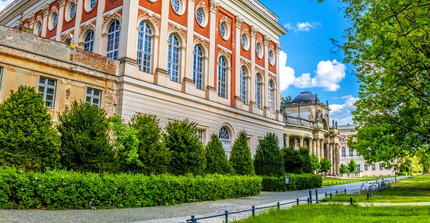Dr. Gerd Mittelstädt
UP Reconnect Guest: Dr. Gerd Mittelstädt
Visiting from: New Zealand
Home Institution: Victoria University of Wellington
Host at the UP: Prof. Dr. Petra Wendler
Institute at the University of Potsdam: Institute of Biochemistry and Biology
Time of the visit: December 2023
Gerd Mittelstädt is Alumnus of the University of Potsdam and is now scientist at the Ferrier Research Institute in Wellington, New Zealand. In this interview, he gives insights in his work life and talks about current research projects in the field of antibiotics.
Dear Gerd Mittelstädt, you graduated from the University of Potsdam in 2009 with a degree in biochemistry - what made you decide to go to New Zealand afterwards?
In 2009, my wife started to study towards her Masters in Geology at the University of Canterbury (Christchurch, NZ). I followed her to take up a Research Assistant position and later (after several major earthquakes) my PhD candidature at the same University.
Together with your UP Reconnect host Prof. Dr. Petra Wendler you have a five year long cooperation going on the publication of Formate Dehydrogenase results. Can you tell us a little about your research project?
The Ferrier Research Institute, which I work for, is dedicated to the development of new drugs through the detailed study of biomolecules and targeted inhibitor design. One of the projects I worked on while in Potsdam also aims to gain detailed understanding of a key metabolic enzyme in bacteria to develop new antibiotics. I am furthermore trying to establish a novel vaccine delivery platform and was testing cryo-EM as a possible screening option for the modified vaccine particles.
What advantage does your stay with UP Reconnect in Potsdam offer you for your research?
As off now, Wellington lacks a sophisticated cryo-EM facility, and New Zealand has no high-end microscope at all. During my stay in Potsdam, I was able to collect valuable hands-on experience in the currently “hot” field of cryo-EM. The results collected here will also be instrumental in answering some of our key research questions and will ultimately lead to more collaborative publications.
How does working at universities in Germany differ from working on the other side of the world in New Zealand?
From my limited experience, I would say all universities are somewhat similar when it comes to scientific research. Science labs generally adopt similar standards and methodology. One major difference working in NZ is the material and instrument availability and shipping times. You often have to share high quality instrumentation or endure long periods of waiting. However, the laid-back Kiwi (work) attitude balances this out.
What experiences during your time here in Potsdam will you remember fondly and what advice would you give to other international researchers considering a stay with UP Reconnect at the University of Potsdam?
It is always interesting how places change and grow over the years. Since my graduation in 2009 the science Campus in Golm has developed into a buzzing hub and that is great to see.
Working with the fantastic team of Prof. Wendler was definitely a highlight for me. An intense crash-course in a new subject outside your own field of expertise always makes you aware of how much more there is to learn.
Is there anything else you want to add?
I would like to thank all the lovely scientific and administrative staff at UP that allowed my stay to be as productive and enjoyable as it was.
Thank you for this interesting interview and we wish you all the best for the future!



